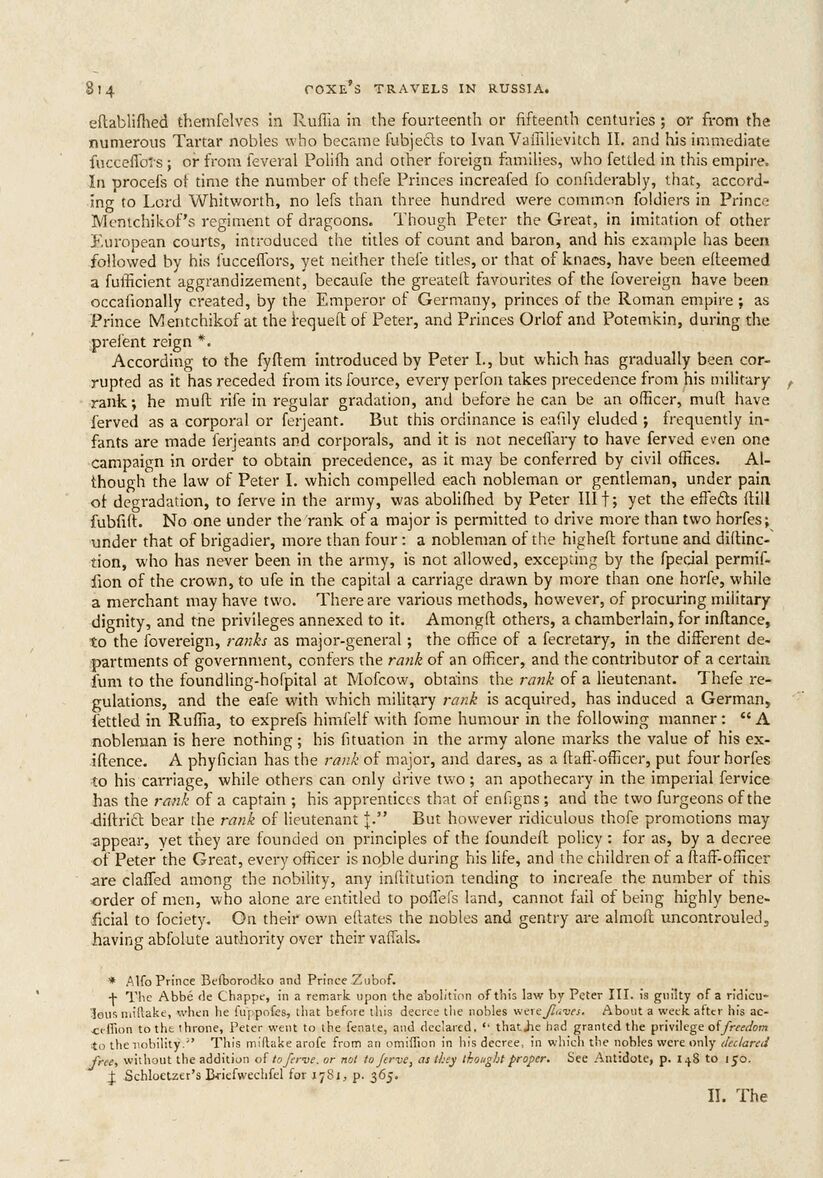
Full resolution (JPEG) - On this page / på denna sida - Pages ...

<< prev. page << föreg. sida << >> nästa sida >> next page >>
Below is the raw OCR text
from the above scanned image.
Do you see an error? Proofread the page now!
Här nedan syns maskintolkade texten från faksimilbilden ovan.
Ser du något fel? Korrekturläs sidan nu!
This page has never been proofread. / Denna sida har aldrig korrekturlästs.
814 COXE’S TRAVELS IN RUSSIA.
eftablifhed themfelves in Ruflia in the fourteenth or fifteenth centuries; or from the
numerous Tartar nobles who became fubjects to Ivan Vaililievitch II. and his immediate
fucceflots; or from feveral Polifh and other foreign families, who fetiled in this empire.
In procefs of time the number of thefe Princes increafed fo confiderably, that, accord-
ing to Lord Whitworth, no lefs than three hundred were common foldiers in Prince
Mentchikof’s regiment of dragoons. ‘Though Peter the Great, in imitation of other
Huropean courts, introduced the titles of count and baron, and his example has been
followed by his fucceflors, yet neither thefe titles, or that of knaes, have been efteemed
a fufficient aggrandizement, becaufe the greate{t favourites of the fovereign have been
occafionally created, by the Emperor of Germany, princes of the Roman empire; as
Prince Mentchikof at the tequeft of Peter, and Princes Orlof and Potemkin, during the
prefent reign *.
According to the fyftem introduced by Peter L, but which has gradually been cor-
rupted as it has receded from its fource, every perfon takes precedence from his military
rank; he muft rife in regular gradation, and before he can be an officer, muft have
ferved as a corporal or ferjeant. But this ordinance is eafily eluded; frequently in-
fants are made ferjeants and corporals, and it is not neceflary to have ferved even one
campaign in order to obtain precedence, as it may be conferred by civil offices. Al-
though the law of Peter I. which compelled each nobleman or gentleman, under pain
of degradation, to ferve in the army, was abolifhed by Peter Ill +; yet the effects {till
fubfift. No one under the’rank of a major is permitted to drive more than two horfes;
under that of brigadier, more than four: a nobleman of the higheft fortune and diftinc-
tion, who has never been in the army, is not allowed, excepting by the fpecial permil-
fion of the crown, to ufe in the capital a carriage drawn by more than one horfe, while
a merchant may have two. Thereare various methods, however, of procuring military
dignity, and tne privileges annexed to it. Amongft others, a chamberlain, for inftance,
to the fovereign, ranks as major-general ;_ the office of a fecretary, in the different de-
partments of government, confers the rank of an officer, and the contributor of a certain
fum to the foundling-hofpital at Mofcow, obtains the rank of a lieutenant. Thefe re-
gulations, and the eafe with which military rank is acquired, has induced a German,
fettled in Ruffia, to exprefs himfelf with fome humour in the following manner: “A
nobleman is here nothing ; his fituation in the army alone marks the value of his ex-
iftence. A phyfician has the rank of major, and dares, as a ftaff-officer, put four horfes
to his carriage, while others can only drive two; an apothecary in the imperial fervice
has the rank of a captain; his apprentices that of enfigns; and the two furgeons of the
diftri& bear the rané of lieutenant }{.’”? But however ridiculous thofe promotions may
appear, yet they are founded on principles of the foundeit policy: for as, by a decree
of Peter the Great, every officer is noble during his life, and the children of a ftaff-officer
are claffed among the nobility, any inftitution tending to increafe the number of this
order of men, who alone are entitled to poflels land, cannot fail of being highly bene-
ficial to fociety. On their own eftates the nobles and gentry are almoft uncontrouled,
having abfolute authority over their vaffals.
* Alfo Prince Befborodko and Prince Zubof.
+ The Abbé de Chappe, in a remark upon the abolition of this law by Peter ITI. is guilty of a ridicu-
Yous miftake, when he fuppofes, that before this decree the nobles were fleves. About a week after his ac-
ceffion to the throne, Peter went to the fenate, and declared, ‘ that,he bad granted the privilege of freedom
to the nobility.””? This miftake arofe from an omiffion in his decree, in which the nobles were only declared
free, without the addition of to ferve. or not to ferve, as they thought proper. See Antidote, p. 148 to 150.
$ Schloetzer’s Briefwechfel for 1781, p. 365.
Il. The
<< prev. page << föreg. sida << >> nästa sida >> next page >>